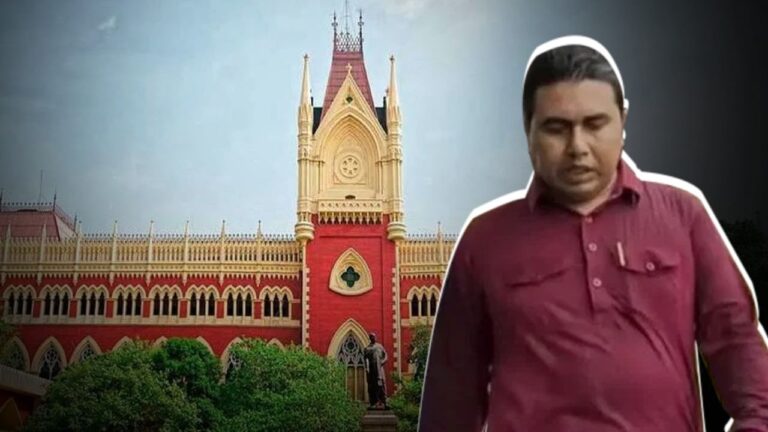News Desk, Kolkata : In a significant development in the Sandeshkhali controversy, Chief Justice of the Kolkata High Court, T. S. Sivagnanam, opened up on the matter. During the hearing of the case regarding the permission for West Bengal opposition leader Subhendu Adhikari to attend court proceedings, Chief Justice Sivagnanam stated, “He is a member of the district council; he cannot unlawfully interfere with the law.” The Chief Justice went on to say, “In a self-motivated case, he can surrender himself,” emphasizing that Subhendu Adhikari faces no hindrance in going to Sandeshkhali.
Addressing the issue further, Chief Justice Sivagnanam remarked, “He is evading arrest. Even after 18 days, nothing has happened. I don’t know if someone is protecting him or not.” The Chief Justice closely monitored the situation, especially concerning the application of Section 144 in Sandeshkhali, stating, “If he is not detained, what is the purpose of invoking Section 144? It amounts to the suffering of ordinary people.”
In the context of the ongoing hearing, the Chief Justice continued to express his concerns, saying, “He may be moving around freely. Despite the passing of 18 days, nothing substantial has occurred.” He raised questions about the effectiveness of the legal system and the authorities in ensuring accountability.
The Chief Justice’s observations during the hearing have sparked heightened interest and anxiety in Sandeshkhali. The Chief Justice’s vigilance is particularly significant, considering the allegations of land encroachment by Adhikari, which has led to a volatile situation in the region. Notably, recent reports in the media have emphasized the Chief Justice’s commitment to closely monitor the proceedings and uphold the rule of law.
Adding to the unfolding drama, the Chief Justice raised pertinent questions about the application of Section 144, asking whether it serves any meaningful purpose in the absence of Adhikari’s detention. The public, particularly the indigenous communities, are closely watching these legal developments, as they involve not just a political leader but also issues related to land rights and potential violence.
In a surprising turn of events, the Chief Justice, known for his principled stance, directed Adhikari to surrender himself in the self-motivated case, signaling a challenge for the opposition leader. This directive has added a new layer to the already complex narrative, raising questions about the possible repercussions for Adhikari and the broader political landscape in West Bengal.
The Sandeshkhali saga has become a focal point of discussion, not only within the legal and political circles but also among the general public. The media’s extensive coverage, coupled with the Chief Justice’s statements, has created a sense of urgency and intrigue surrounding the case.
Recently, the situation escalated when Chief Justice Sivagnanam expressed his concerns during a hearing, highlighting the potential for violence in the region. This comes on the heels of another prominent judge, Justice Apurva Sinha Roy, expressing distress over the Sandeshkhali issue last week. The judiciary’s active involvement in addressing these concerns underscores the gravity of the situation and its implications for the rule of law.
As the legal proceedings unfold, the Sandeshkhali controversy continues to capture the attention of the public, with Chief Justice Sivagnanam’s remarks adding a new dimension to the unfolding drama. The call for Adhikari’s surrender and the scrutiny of Section 144 raise critical questions about the state of governance, accountability, and the protection of basic rights in the region.
In conclusion, the Sandeshkhali saga has evolved into a multifaceted narrative, blending legal intricacies with political dynamics and social implications. The Chief Justice’s active role in overseeing the proceedings has heightened the significance of this case, making it a focal point of public discourse and a test of the judiciary’s commitment to upholding justice and the rule of law in West Bengal.
DISCLAIMER
Our news media denounces any form of bias and disapproves of sensationalism. The disseminated news is entirely educational and aimed at social awareness. Our media maintains absolute impartiality, adhering solely to the purpose of education and social consciousness.


